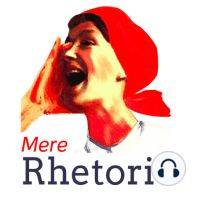7 min listen
The Rise of Writing (Deborah Brandt)
FromMere Rhetoric
ratings:
Length:
8 minutes
Released:
Jan 16, 2019
Format:
Podcast episode
Description
Welcome to Mere R the podcast for beginners and insiders about the people, ideas and movements that shaped rhetorical history. I’m Mary H and if you grew up in the eighties and nineties, like I did, then you might remember a series of posters in your school and public library. Celebrities like Sarah Jessica Parker,A-Rod and, of course, Lavar Burton would be posed with a book, smiling, encouraging you to read. They were all readers, and so should you, because being a reader was a worthy identity. Deborah Brandt, in her decades of interviews with people of all walks of life, found that being a reader had very different connotations than being a writer. Readers were feted, writers were suspect; readers had clubs, writers had isolation; reading was receptive, writing was productive. However, in Brandt’s latest book, The Rise of Writing, she finds something changing--our definition of literacy is swinging from readers to writers. The subtitle of her book is redefining mass literacy, and that’s just what her interviews reveal--that writing, not reading, is becoming the definition of literacy. She gives a definition of what this looks like: “Writing based literacy is a literacy driven primarily through engagement with and orientation toward writing instead of reading--a literacy that develops by way of emphasizing and embracing the social role of the writer rather than the social role of the reader” (91). Writing-based literacy is necessary as an increasing number of jobs in both the public and private sectors require writing as part of the work. Often the writer-employee is paid as a condition of the employment, rather than given authorial rights. Instead of getting a byline and a royalty credit, people like lawyers and government officials write in the voice of their company or office. As legal voices have claims “once a person is employed to say what she does, the speech usually represent not her own self-expression but, at best, the expression of the employer” (qtd. 23)This is not a small group--More than a third of the writers Brandt interviewed ghost write, usually for their superiors (32-33). These writer-workers must compose with a borrowed identity (48) One government writer says “I try to be a reasonable voice of the institution. I can’t got outside my role” (75). However, it’s one thing to put off your authorship when writing on the job, but increasingly people associated with organizations must continue to restrict their writing off the job.Brandt says that the government “readily recognized the intimate intermingling of writer subjectivity with institutional mission as the dangerous mix that potentially undermines the government’s voice when employees speak out in the public domain and political arena, Yet they remain incurious about how this dangerous mix affects the citizen voices of millions of Americans” (87). “When it comes to writing, people’s expressive voices seem inevitably entangled with interests and liabilities of the organizations that employ them--and often cannot be comfortable extricated even off the job” (164). She calls this the “residue of authorship” (27)--the way you change after putting on the writing mask of the job. A writer at a non-partisan agency explains “in terms of our private lives as non-partisan legislative service agency employees, it is made clear to everyone that there are strict boundaries that we cannot cross. You have to agree to this.You are basically giving up your constitutional rights. We discourage any type of external correspondence that would be published anywhere” (82). Writing isn’t just an anonymous workplace practice in this new literacy, though. It’s also a hyper personalized practice. Brandt interviewed young people about their writing practices and found that writing was actively enjoyed and productive for these young adults the way reading sometimes is. Her so called unaffiliated writers “wrote enthusiastically outside of school...but did not play to
Released:
Jan 16, 2019
Format:
Podcast episode
Titles in the series (99)
Dionysius of Halicarnassus: Today we’re doing a podcast on Dionysius of Halicarnassus, not least because it’s so fun to say his name. Some people just have the kind of name that makes you want to say it all out, in full. Say it with me: Dionysius of Halicarnassus.... by Mere Rhetoric
